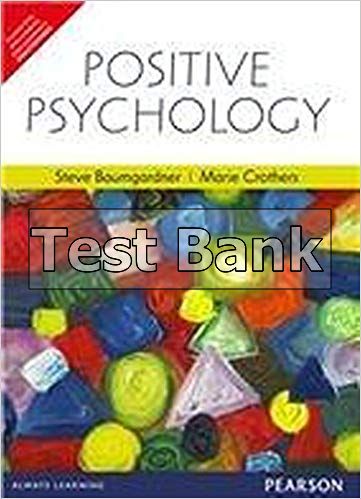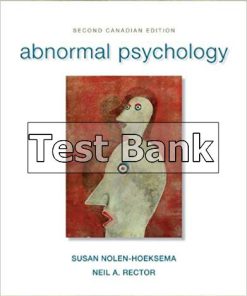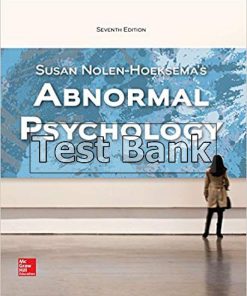Positive Psychology 1st Edition Baumgardner Test Bank
You may also like
-
$26.50
$50.00 -
$26.50
$50.00 -
$26.50
$50.00
Positive Psychology 1st Edition Baumgardner Test Bank

Product details:
- ISBN-10 : 0131744410
- ISBN-13 : 978-0131744417
- Author: Crothers Marie Baumgardner Steve
This book is designed to serve as a primary text for an undergraduate college course in positive psychology. Consistent with the “nuts and bolts” presentation of positive psychology, in many places throughout the book the authors provide detailed coverage of individual research studies, methodological issues and theoretical controversies.
The first goal in writing this book was to make positive psychology accessible to undergraduate students by reviewing and summarizing the major empirical findings and theories within the major areas of positive psychology. Specifically, the authors hope to bridge the gap between an undergraduate audience and the professional level of source material. A second goal was to present the core topics of positive psychology in a way that preserves the richness and excitement of findings in this new area of psychology. Positive psychology addresses important questions about how we lead our lives, find happiness and satisfaction in life, and deal with life’s challenges. As a result, the subject matter of positive psychology has high intrinsic interest. The authors hope to engage and maintain this interest by making frequent connections and applications to the everyday lives of readers.
Table contents:
Chapter 1 -What is Positive Psychology?
– Traditional Psychology
– Why the Negative Focus?
Negatives Aspects Perceived as More Authentic & ‘Real�
Negatives as More Important
The Disease Model
-Positive Psychology
Health Psychology
Focus on Research: The Nun Study: Living Longer Through
Positive Emotions
Clinical Psychology
Developmental Psychology
Survey Research and Subjective Well-Being
Social/Personality Psychology and the Psychology of Religion
– Positive Psychology: Assumptions, Goals and Definitions
Life Above Zero
Culture and the Meaning of a Good Life
Why Now?
-Two Final Notes
Positive Psychology is Not Opposed to Psychology
Positive Psychology and the Status Quo
Chapter 2 — The Meaning and Measure of Happiness
– Why a Psychology of Well-Being?
Objective versus Subjective Measures
Negative versus Positive Functioning
– What is Happiness? Two Traditions
Hedonic Happiness
Eudaimonic Happiness
Focus on Research: Positive Affect and a Meaningful Life
– Subjective Well-Being: The Hedonic Basis of Happiness
Measuring Subjective Well-Being
Life Satisfaction
Positive Affect and Negative Affect
Focus on Research: Is Your Future Revealed in Your Smile?
Issues in the Study of Affect
Global Measures of Happiness
Reliability and Validity of SWB Measures
Experience Sampling Method
Focus on Method: How Do We Spend Our Time? The Day
Reconstruction Method
On-Line versus Global Measures of SWB
– Self-Realization: The Eudaimonic Basis of Happiness
-Psychological Well-Being and Positive Functioning
Emotional Well-Being
Psychological Well-Being
Social Well-Being
Need Fulfillment and Self-Determination Theory
Focus on Research: What Makes a “Good� Day?
– Comparing Hedonic and Eudaimonic Views of Happiness
Chapter 3 – Positive Emotions and Well-Being
– What are Positive Emotions?
Focus on Theory: The Broaden-and-Build Theory of Positive
Emotions
– Positive Emotions and Health Resources
Physical Resources
Psychological Resources
Positive Emotions and Coping with Stress
-Focus on application: Finding the Positive in the Negative
Positive Traits and Health
Social Resources
The Limits of Positive Emotions
Positive Emotions and Well-Being
Happiness and Positive Behaviors
Positive Emotions and Success
Positive Emotions and Flourishing
A General Theory of Positivity?
– Cultivating Positive Emotions
Flow Experiences
Savoring
Chapter 4 – Resilience
-What is Resilience?
Developmental Perspectives
Clinical Perspectives
– Resilience Research
Sources of Resilience
The Dangers of Blaming the Victim
Sources of Resilience in Childhood
– Focus on Research: Resilience among Disadvantaged Youth
Sources of Resilience in Adulthood and Later Life
Successful Aging
– Growth Through Trauma
Negative Effects of Trauma
Positive Effects of Trauma
Changes in Perception
Changes in Relationships
Changes in Life Priorities
Explanations for Growth through Trauma
Focus on Research: In their Own Words — Coping With Loss
Chapter 5 – Happiness and the Facts of Life
– Happiness Across the Life-Span
Focus on Research: Happiness and Where we Live
Stability in Well-Being Despite Life Changes
Temperament and Subjective Well-Being
Frequency, Intensity and Balance of Positive and
Negative Emotions
Measurement and Definitional Issues
-The Shifting Basis of Life Satisfaction
Gender and Happiness
– Gender differences in Emotional Experience
– Negative Emotions
Positive Moods and Behaviors
Explaining the Paradox of Gender
– Marriage and Happiness
Benefits of Marriage
Selection Effects
Focus on Research: Are We Still Happy After the
Honeymoon?
Gender Differences in the Benefits of Marraige
– Other Facts of Life
Physical and Mental Health
Work and Unemployment
Intelligence and Education
Religion
Race, Ethnicity and Stigma
Chapter 6 — Money, Happiness and Culture
– The Paradox of Affluence
– Well-Being Across Nations
Between-Nations Comparisons
Within-Nation Comparisons
Interpreting National Differences
– Understanding Money and Happiness
Focus on Research: Do Happy People Make More Money?
Why Doesn’t Money Matter More?
Genetics and Personality
Adaptation and the Hedonic Treadmill
Focus on Research: Lottery Winners and Accident Victims
Rising Expectations and The “Tyranny of the Unnecessary�
Social Comparisons
Excessive Materialism
– The Meaning of Happiness: Universal or Relative?
– The Culture and Well-being
The Self in Individualistic and Collectivist Cultures
Culture and the Meaning of Happiness
The American-Individualistic Style of Happiness
The Asian-Collectivist Style of Happiness
Cultural Ideals
Moderation in Emotional Expression
Group Pride and Sensitivity
Self-Critical Attitudes
False Humility or Social Sensitivity?
Chapter 7 – Personal Goals as Windows to Well
Being
– Goals Connect “Havingâ€� and “Doingâ€�
– What are Personal Goals?
Defining Personal Goals
Goals and Related Motivational Concepts
Measuring Personal Goals
Goal Organization
– The Search for Universal Human Motives
Goals and the Fulfillment of Basic Human Needs
Focus on Research: An Empirical Method for Assessing Universal Needs
Goals Expressing Fundamental Values
Personal Goals Across Cultures
Intrinsic versus Extrinsic Goals
Physical versus Self-Transcendent Goals
– The Personalization of Goals in Self-Concept
– What Goals Contribute Most to Well-Being?
Goal Progress, Achievement and Importance
-The Matching Hypothesis
What Explains the Matching Hypothesis?
-Personal Goals and Self-Realization
Intrinsic versus Extrinsic Goals
Autonomous versus Controlled Motivation
Focus on Research: Happiness and Success in College
– Materialism and Its Discontents
Why are Materialists Unhappy?
The Content of Materialistic Goals
-The What and Why of Materialistic Goals
Compensation for Insecurity
Why Do People Adopt Materialistic Values?
Consumer Culture
Psychological Insecurity
Materialism and Death
Affluence and Materialism
Are We All Materialists?
Chapter 8 – Self-Regulation and Control
-The Value of Self-Control
– Personal Goals and Self-Regulation
Self-Discrepancy Theory
Control Theory
– Planning for Self-Regulation Success
Focus on Research: Planning Makes a Difference
Why Planning Helps
Automatic Activation of Goal Behaviors
Conserving Self-Control Resources
Commitment and Confidence
– Goals That Create Self-Regulation Problems
Approach versus Avoidance Goals
Why Avoidance Goals are Difficult to Regulate
Goal Conflict
-Trivial Pursuits and Magnificent Obsessions
-Focus on theory: Thinking About the Meaning of Our Actions
Individual differences in Goal Level Identification
Goal Difficulty
Ironic Effects of Mental Control
-Mental Load and the Paradoxes of Control
– Everyday Explanations for Self-Control Failure
Excuses
What Makes a Good Excuse?
Advantages of Excuses
Disadvantages of Excuses
Irresistible Impulses
Beliefs About Control
Activation of Impulsive and Reflective Control Systems
Individual Differences in Self-Control
Resisting Temptations
Focus on Research: The Costs and Benefits of Procrastination
– Giving Up
Chapter 9 — Positive Traits
– What Makes a Trait Positive?
– Personality, Emotions and Biology
Positive and Negative Affectivity
Genetics and Temperament
Personality and Happiness: “The Big Five�
-Teasing Out Cause and Effect
Personality and Eudaimonic Well-Being
Neurobiology and Approach/Avoidance Motives
Genetics and Change
– Positive Beliefs
-The World Through Happy and Unhappy Eyes
– Self Esteem
Self-Esteem and Happiness
Is Self-Esteem All You Need?
Self-Esteem’s Darker Side
Personal Control
Optimism
Optimism as a Disposition
Optimism as Explanatory
People also search:
positive psychology 101 pdf
positive psychology 101
|
positive psychology exam 1 quizlet
|
positive psychology (3rd edition pdf)
a primer in positive psychology free pdf












